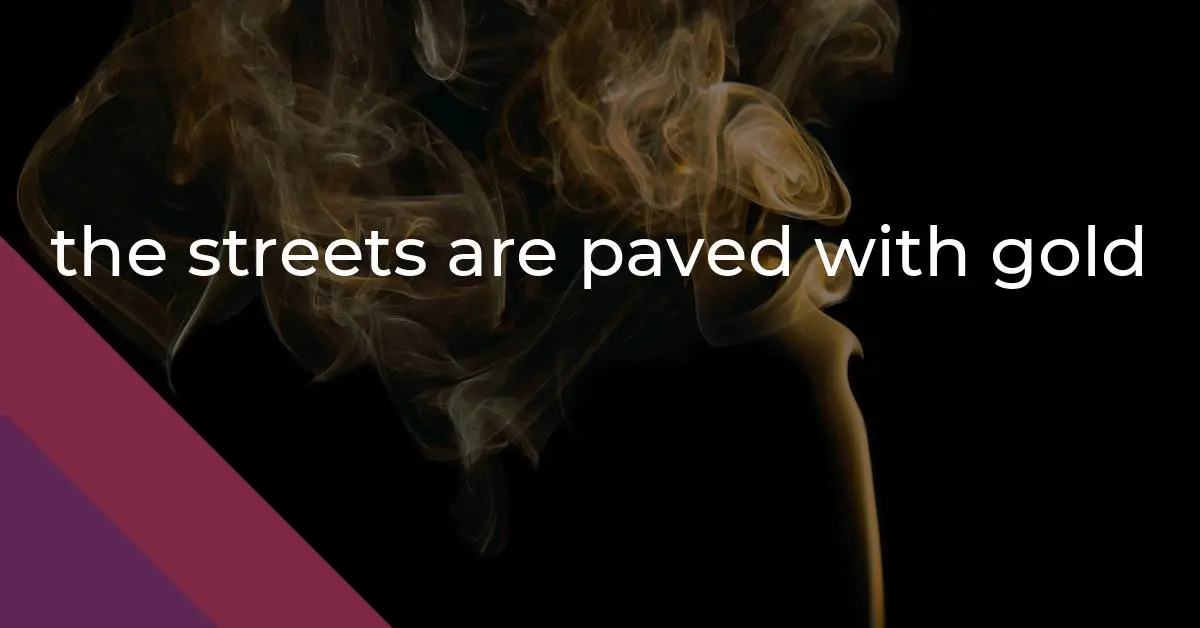the streets are paved with gold: Idiom Meaning and Origin
What does ‘the streets are paved with gold’ mean?
The idiom "the streets are paved with gold" means that a place offers many opportunities for success and prosperity.

Idiom Explorer
The idiom "yellow brick road" refers to a path or journey that is exciting or full of promise, but may also be challenging or deceptive.
The idiom "up someone's street" means that something is suited to a person's interests, skills, or preferences.
The idiom "strike it rich" means to become very wealthy or successful, usually by luck or sudden success. It implies a significant financial or career breakthrough that leads to a highly prosperous outcome.
The idiom "streets ahead" means to be significantly more advanced or superior to something or someone else. It is often used to describe a person or thing that is far ahead in terms of skills, abilities, or performance.
The idiom "Promised Land" refers to a long-awaited place or situation where one hopes to find success, happiness, or fulfillment. It originates from the biblical story of Moses leading the Israelites to the land God promised them. However, the meaning has expanded beyond its religious context and is now used to describe any desired goal or destination.
The idiom "pound the pavement" means to walk or travel on foot, especially in search of employment or to promote a cause.
"Pave the way" means to make preparations or create conditions that will make it easier for something to happen or someone to achieve success.
The idiom "pave the road to hell" means that even though someone may have good intentions, their actions or decisions can ultimately lead to negative consequences or harm.
The idiom "on the street" means to be homeless or without a place to live. It can also refer to being unemployed and actively looking for work.
The idiom "land of opportunity" refers to a place or situation where there are many opportunities for success, especially in terms of economic and social advancement.
Golden Pathway
The idiom "the streets are paved with gold" describes a place where abundant opportunities and wealth are believed to be readily available. It is often used to depict the allure and promise of a particular location or situation. The idiom itself conjures up the image of streets made of gold, symbolizing wealth, success, and prosperity. It suggests that in this imagined place, wealth and opportunities are effortlessly attained, as if they are just lying on the ground waiting to be picked up. However, this idiom is used figuratively and not to be taken literally, as no actual place with streets made of gold exists.
The idiom has been used throughout history in various contexts, often in relation to immigration and the pursuit of a better life. It is commonly associated with the idea of the United States being a land of opportunity, particularly during the late 19th and early 20th centuries. For many, America represented the "land of opportunity," where individuals could start afresh and achieve their dreams. The idiom "the streets are paved with gold" exemplifies this belief in the limitless possibilities and abundance of wealth that awaited those who took a chance on America.
During the time of the gold rushes in the United States, such as the California Gold Rush in the mid-1800s, the idiom gained popularity and came to represent the dreams and aspirations of those who sought their fortune in the newfound wealth of the gold-mining regions. Individuals from around the world flocked to California with the hope of striking it rich and transforming their lives. The idiom "the streets are paved with gold" encapsulated the dreams and aspirations of these fortune seekers, who believed that their relentless pursuit of gold would lead them to a life of luxury and success.
European folklore and fairy tales also contributed to the development of the idiom "the streets are paved with gold." In these tales, the notion of streets paved with precious metals or jewels was used to portray a land of unlimited riches. This imagery likely influenced the idiom and its association with the pursuit of wealth. By evoking these fantastical images, the idiom captured the imagination of those seeking a better life and conveyed the allure of boundless possibilities.
Throughout literature and popular culture, the idiom "the streets are paved with gold" has been utilized to represent the American Dream. The American Dream is the belief that anyone, regardless of their background or circumstances, can achieve success and prosperity through hard work and determination. The idiom exemplifies the optimism and idealization of this concept, highlighting the promise and potential for a better life that awaits those who are willing to work for it.
However, it is important to recognize that the idiom is often used ironically or sarcastically to underscore the contrast between the perceived opportunities and the challenging reality that individuals may face in their pursuit of success. While the idiom carries a sense of optimism and promise, it also conveys the complexity and uncertainty of the pursuit of wealth and success. It serves as a reminder that the path to achieving wealth and success is not as easy or straightforward as initially envisioned, and that hard work and perseverance are often necessary to overcome obstacles and achieve one's goals.
The idiom "the streets are paved with gold" is related to other idioms that similarly reflect the pursuit of wealth and success. One such idiom is "land of opportunity," which is often used to describe a place where individuals believe they can achieve their dreams and improve their circumstances. This idiom aligns closely with the concept of the United States as a land of opportunity, as it signifies the belief in the potential for upward mobility and the chance to build a better life.
Another related idiom is "easy street," which refers to a situation or condition in which an individual experiences financial comfort and security without much effort. This idiom suggests that the path to wealth and success is simple and straightforward, without the trials and tribulations that often accompany the pursuit of such goals. However, it is important to note that "easy street" is often used ironically to highlight the unrealistic nature of this notion and to emphasize that true success requires hard work and dedication.
Finally, the idiom "gold mine" is another related expression that signifies a source of great wealth or abundance. It is often used to describe a business, investment, or opportunity that has the potential for significant financial gain. The idiom "the streets are paved with gold" shares a similar sentiment with "gold mine," as both expressions evoke the idea of wealth and prosperity being readily available for the taking.
The idiom "the streets are paved with gold" represents the allure and promise of abundant opportunities and wealth. It captures the belief in the limitless possibilities that await those who seek a better life. The idiom is often used to depict the United States as a land of opportunity and has been associated with the dreams and aspirations of those pursuing wealth during various historical periods. While the idiom carries a sense of optimism, it also acknowledges the challenges and uncertainties of the pursuit of wealth and success. Furthermore, it is related to other idioms such as "land of opportunity," "easy street," and "gold mine," all of which convey the desire for financial prosperity and the pursuit of a better life.
Example usage
Examples of the idiom the streets are paved with gold used in a sentence:
- The young artist believed that if he moved to the big city, the streets would be paved with gold and he would become an overnight success.
- Many people have the misconception that migrating to a prosperous country automatically means the streets are paved with gold, but the reality is often different.
- After losing his job, John decided to start his own business, hoping that entrepreneurship would lead him to a life where the streets were paved with gold.
More "Opportunity" idioms



